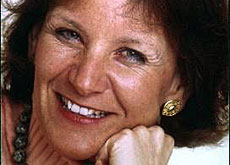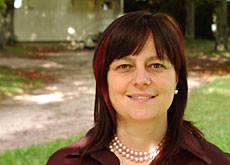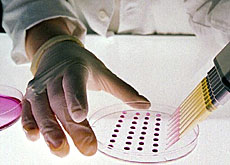Human dignity versus scientific freedom

Voters in Switzerland will soon decide whether to allow research on stem cells from surplus human embryos - a move that many find unethical.
Theologian and ethicist Ruth Baumann-Hölzle told swissinfo that embryos have both rights and dignity and therefore shouldn’t be used for scientific purposes.
The vote, due to take place next Sunday, is highly controversial. Scientists argue that stem-cell research is vital to help combat incurable diseases such as Alzheimer’s.
In Geneva, researcher Marisa Jaconi has already been granted permission to import human embryonic stem cells from the United States (see related interview).
But Baumann-Hölzle, an expert in medical ethics, rejects the draft law because it involves the destruction of embryos.
swissinfo: You are very critical of human stem-cell research. Can you explain why?
Ruth Baumann-Hölzle: This type of research is a step backwards. It has taken time and effort to realise that human beings deserve respect and that they should not be regarded as objects or treated as such.
Stem-cell research is also threatening the concept of human dignity. Human life – because an embryo is a human life – is being exploited for ends which are alien to it. This attitude reflects the functional culture in which we live.
Humanity seems to want to give itself new powers by perverting the nature of embryos. And by powers, I mean cloning and tampering with the development of human life.
At this point, we should ask ourselves if we should be doing this. How much damage have we already caused to the environment by chasing profits?
swissinfo: But stem-cell research might help find cures for some degenerative illnesses.
R.B.-H.: I read somewhere that one day we shall even triumph over old age, if not death itself. This is an illusion, which is becoming more current, arising from a concept of absolute control.
I am opposed to these ideas. We will not succeed in taming nature, in defeating old age and death. They say that by using embryonic stem cells we shall be able to cure diseases such as Alzheimer’s, but these are empty promises.
If you remember the early enthusiasm for genetic engineering, it was the same thing. It was also hoped then that cures would be found using somatic cell therapies. But few, if any, of these hopes have been fulfilled. I think it is wrong to use the sick for electoral purposes, exploiting their suffering to snatch a “yes” vote for stem-cell research.
swissinfo: Our society accepts in vitro fertilisation, which involves creating surplus embryos. Why is it more reasonable to destroy them than to make them available for research?
R.B.-H.: Embryos are condemned to die outside a woman’s body. But you cannot use this argument to justify research. What would happen if it were extended to the dying? This is the whole point: the weakest and most vulnerable forms of life are under threat.
We have fought – and continue to fight – for the rights of the dying or the dead, to ensure that their organs are not removed without authorisation and that they are not used for research purposes without their consent.
Of course, the embryo cannot say what it wants. But the concept of dignity should not depend on how able a person is to express their views. If it did, we would have to examine our decision to grant human rights to people with disabilities.
It’s not possible to prove scientifically when dignity begins and ends. But where there’s doubt, I favour dignity, because I consider it to be a precious cultural asset.
swissinfo: A woman who has an abortion is also destroying an embryo. Why shouldn’t researchers, who work for society as a whole, be allowed to do the same?
R.B.-H.: You cannot compare these two conflicting issues. We cannot oblige a human being to make her body available to guarantee the right to life of another being. This is a direct conflict between life-in-the-making and a woman’s right to decide.
There’s a similar conflict over transplants. We could save many lives if we forced people to donate a kidney, but because people are entitled to decide for themselves about their bodies, we must respect that.
The situation is different for research. The embryo is not in the researcher’s body, but outside; there’s no direct relationship between the two and therefore no conflict over autonomy.
swissinfo: The law due to be voted on is very restrictive and would regulate this sector. Wouldn’t this be better than the uncertainty that prevails at present?
R.B.-H.: We cannot say for certain that research on imported stem cells will continue regardless. Issuing the import permit was, in my opinion, an anti-constitutional act. Now we have to ask ourselves if we really want to reduce human life to the status of a thing.
This is a matter of principle that needs to be discussed and it cannot be restricted to stem-cell research. This is a development that is likely to deprive us of ethical arguments in the future. If we take this step, how can we then oppose cloning and human gene manipulation?
By saying no to embryonic stem-cell research, the Swiss can take an international stand and show themselves to be fully committed to human rights and dignity.
swissinfo-interview: Doris Lucini
In 1999, American scientist James Thomson succeeded in isolating human embryonic stem cells in the laboratory.
In 2001, a team of researchers in Geneva were granted permission to import human embryonic stem cells from the USA.
On November 28, the Swiss will vote on a proposed law regulating stem-cell research.
Ruth Baumann-Hölzle runs “Dialog Ethik”, an interdisciplinary institute based in Zurich which is concerned with medical ethical issues.
She opposes to stem-cell research because it involves the destruction of embryos, saying embryos have human rights.
Stem cells are cells which have the potential to grow into any human cell or tissue.

In compliance with the JTI standards
More: SWI swissinfo.ch certified by the Journalism Trust Initiative











You can find an overview of ongoing debates with our journalists here . Please join us!
If you want to start a conversation about a topic raised in this article or want to report factual errors, email us at english@swissinfo.ch.